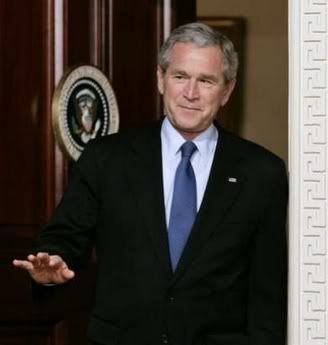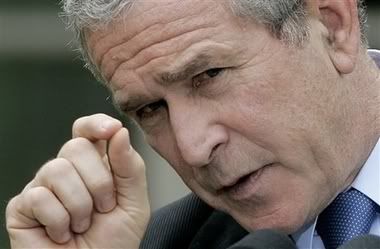
Quote of the Day: (the President's opening statement from his press conference this morning)
THE PRESIDENT: Thank you. Before I take your questions I'd like to discuss a couple subjects. First I want to briefly mention that today we've released the actual budget numbers for the fiscal year that ended on September the 30th. These numbers show that we have now achieved our goal of cutting the federal budget deficit in half, and we've done it three years ahead of schedule. The budget numbers are proof that pro-growth economic policies work. By restraining spending in Washington and allowing Americans to keep more of what they earn, the economy is creating jobs and reducing the deficit and making our nation a more prosperous nation for all our citizens.
I'm going to talk about the pro-growth economic policies that helped bring about the dramatic reduction in the deficit this afternoon, and I'm going to remind our fellow citizens that good tax policy has a lot to do with keeping the economy strong, and therefore, we'll continue to urge the Congress to make the tax cuts permanent.
I also want to talk about the unfolding situation in North Korea. Earlier this week, the government of North Korea proclaimed to the world that it had conducted a successful nuclear test. The United States is working to confirm North Korea's claim, but this claim, itself, constitutes a threat to international peace and stability.
In response to North Korea's actions, we're working with our partners in the region and the United Nations Security Council to ensure there are serious repercussions for the regime in Pyongyang. I've spoken with other world leaders, including Japan, China, South Korea, and Russia. We all agree that there must be a strong Security Council resolution that will require North Korea to abide by its international commitments to dismantle its nuclear programs. This resolution should also specify a series of measures to prevent North Korea from exporting nuclear or missile technologies, and prevent financial transactions or asset transfers that would help North Korea develop its nuclear and missile capabilities.
Last year, North Korea agreed to a path to a better future for its people in the six-party talks -- September of last year. We had an agreement with North Korea. It came about in the form of what we call the six-party joint statement. It offered the prospect for normalized relations with both Japan and the United States. It talked about economic cooperation in energy, trade and investment. In that joint statement, North Korea committed to abandoning all nuclear weapons and existing nuclear programs, and to adhering to the Treaty on Non-proliferation of Nuclear Weapons and to IAEA safeguards. They agreed.
The United States affirmed that we have no nuclear weapons on the Korean Peninsula. We affirmed that we have no intention of attacking North Korea. With its actions this week, North Korea has once again chosen to reject the prospect for a better future offered by the six-party joint statement. Instead, it has opted to raise tensions in the region.
I'm pleased that the nations in the region are making clear to North Korea what is at stake. I thank China, South Korea, Japan, and Russia for their strong statements of condemnation of North Korea's actions. Peace on the Korean Peninsula requires that these nations send a clear message to Pyongyang that its actions will not be tolerated, and I appreciate their leadership.
The United States remains committed to diplomacy. The United States also reserves all options to defend our friends and our interests in the region against the threats from North Korea. So, in response to North Korea's provocation, we'll increase defense cooperation with our allies, including cooperation on ballistic missile defense to protect against North Korean aggression, and cooperation to prevent North Korea from exporting nuclear and missile technologies.
Our goals remain clear: peace and security in Northeast Asia and a nuclear-free Korean Peninsula. We will take the necessary actions to achieve these goals. We will work with the United Nations. We'll support our allies in the region. And together, we will ensure that North Korea understands the consequences if it continues down its current path.
I'd like to discuss the latest developments in Iraq. This morning I just had a meeting with Secretary Rumsfeld and General George Casey, who is in town today. General Casey, as you know, is the top commander on the ground in Iraq. The brutality of Iraq's enemies has been on full display in recent days. Earlier this week, Deputy President Tariq al-Hashimi lost his brother, Major General Hashimi, when gunmen dressed in police uniforms broke into his house and shot him in the head. Only a few months ago, his sister and other brother were assassinated. On behalf of the United States, I express my heartfelt condolences to the al-Hashimi family. And we express our condolences to all those who've suffered at the hands of these brutal killers.
The situation is difficult in Iraq, no question about it. The violence is being caused by a combination of terrorists, elements of former regime criminals and sectarian militias. Attacks and casualties have risen during the Ramadan period. A rise in violence has occurred every Ramadan period in the last three years.
Attacks and casualties have also increased recently because our forces are confronting the enemy in Baghdad and in other parts of Iraq. The past weekend, U.S. and Iraqi forces engaged militias -- or members of an illegal militia -- during a mission to capture a high-value target. The reason I bring this up is that we're on the move. We're taking action. We're helping this young democracy succeed. The reasons we went after the illegal militia was to capture a man responsible for killing many innocent Iraqis, and we accomplished that mission. Our troops have increased their presence on the streets of Baghdad, and together with Iraqi forces, they're working to ensure that terrorists and death squads cannot intimidate the local population and operate murder rings.
Amid the violence, important political developments are also taking place. The Iraqi legislature reached a compromise and set up a process for addressing the difficult issues of federalism and constitutional reform. In addition, the government of Prime Minister Maliki has taken three important steps to build confidence in his government and in the Iraqi security forces. First, Prime Minister Maliki announced a plan to bring together Sunni and Shia parties and stop sectarian violence. The Prime Minister's plan has received support from every major political group in Iraq, including some hard-line Sunni elements that chose not to join the unity government. Among the steps the Prime Minister announced is a new system of local and neighborhood committees, made up of both Sunni and Shia members, that will work directly with Iraqi security forces to resolve tensions and stop sectarian strife.
Second, this past weekend Prime Minister Maliki met with tribal leaders from the Anbar Province. These tribal leaders told him they've had enough of the terrorists seeking to control the Sunni heartland, and they're ready to stand up and fight al Qaeda. The Prime Minister told them that he welcomed their support and would help them.
Third, Prime Minister Maliki's government suspended the Eighth Brigade, Second Division of the national police after learning that this unit was not intervening to stop sectarian violence in and around Baghdad. This police brigade has been decertified by the Iraqi Ministry of Interior; it's been removed from service; it's now being reviewed and retrained. With this action, the Iraqi government has made clear it's not going to tolerate the infiltration of the Iraqi security forces by militias and sectarian interests.
The reason I bring this up, these examples up, is that there's a political process that's going forward, and it's the combination of security and a political process that will enable the United States to achieve our objective, which is an Iraq that can govern itself, sustain itself, defend itself, and be an ally in this war on terror.
Iraq's government -- Iraq's democratic government is just four months old. Yet, in the face of terrorist threats and sectarian violence, Iraq's new leaders are beginning to make tough choices. And as they make these tough decisions, we'll stand with them, we'll help them. It's in our interests that Iraq succeed.
I fully understand the American people are seeing unspeakable violence on their TV screens. These are tough times in Iraq. The enemy is doing everything within its power to destroy the government and to drive us out of the Middle East, starting with driving us out of Iraq before the mission is done. The stakes are high. As a matter of fact, they couldn't be higher. If we were to abandon that country before the Iraqis can defend their young democracy the terrorists would take control of Iraq and establish a new safe haven from which to launch new attacks on America. How do I know that would happen? Because that's what the enemy has told us would happen. That's what they have said. And as Commander-in-Chief of the United States military, and as a person working to secure this country, I take the words of the enemy very seriously, and so should the American people.
We can't tolerate a new terrorist state in the heart of the Middle East, with large oil reserves that could be used to fund its radical ambitions, or used to inflict economic damage on the West. By helping the Iraqis build a democracy -- an Iraqi-style democracy -- we will deal a major blow to terrorists and extremists, we'll bring hope to a troubled region, and we'll make this country more secure.
The President's entire Press Conference is "Quote of the Day" material. Click on the link and read it all!























































